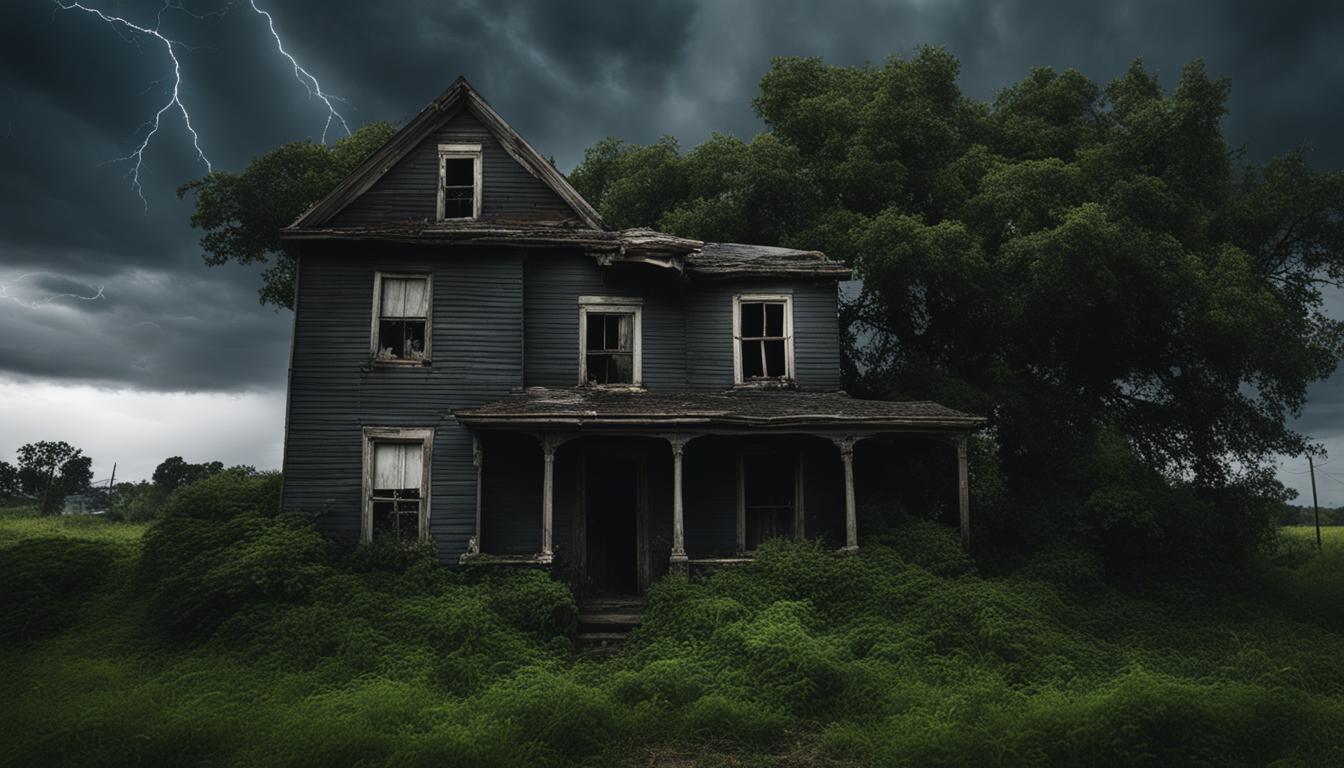Originally posted on January 1, 2024 @ 5:33 am
Welcome to our exploration of the fascinating world of superstitions surrounding houses. Have you ever wondered if a house can be cursed with bad luck? Are you curious about the various beliefs and superstitions surrounding cursed houses? In this article, we will dive deep into the topic and provide insights into the truth behind these age-old notions.
Throughout history, people have associated houses with mysterious forces and supernatural occurrences. From haunted houses to beliefs in negative energy, superstitions surrounding houses have captured the imaginations of many. However, it’s important to approach these beliefs critically and distinguish between folklore and factual evidence.
While some may believe that houses can be cursed with bad luck, it’s crucial to understand that bad luck is often a subjective experience influenced by individual perceptions. In reality, it is more likely that bad luck stems from negative thinking and mindset rather than an actual curse. All of us encounter misfortune at some point in our lives, and it is relative to our own experiences.
As we dive deeper into this topic, we will examine common superstitions, explore the idea of negative energy affecting houses, discuss house blessings and cleansing rituals, and delve into the intriguing concept of the evil eye. By the end of this article, you’ll gain a better understanding of these superstitions and be equipped to approach them with a critical mindset.
Key Takeaways:
- Superstitions about houses being cursed with bad luck have been prevalent throughout history.
- Bad luck is subjective and often a result of negative thinking and mindset rather than an actual curse.
- Beliefs in haunted houses and negative energy affecting houses are based on personal beliefs and do not have factual evidence.
- House blessings and cleansing rituals are performed by some to remove negative energy or a supposed curse from a house, but their effectiveness is based on personal beliefs.
- The evil eye is a superstition believed to bring bad luck, illness, or misfortune, but it lacks scientific basis.
The Power of Superstitions: Haunted Houses and Bad Luck in Real Estate
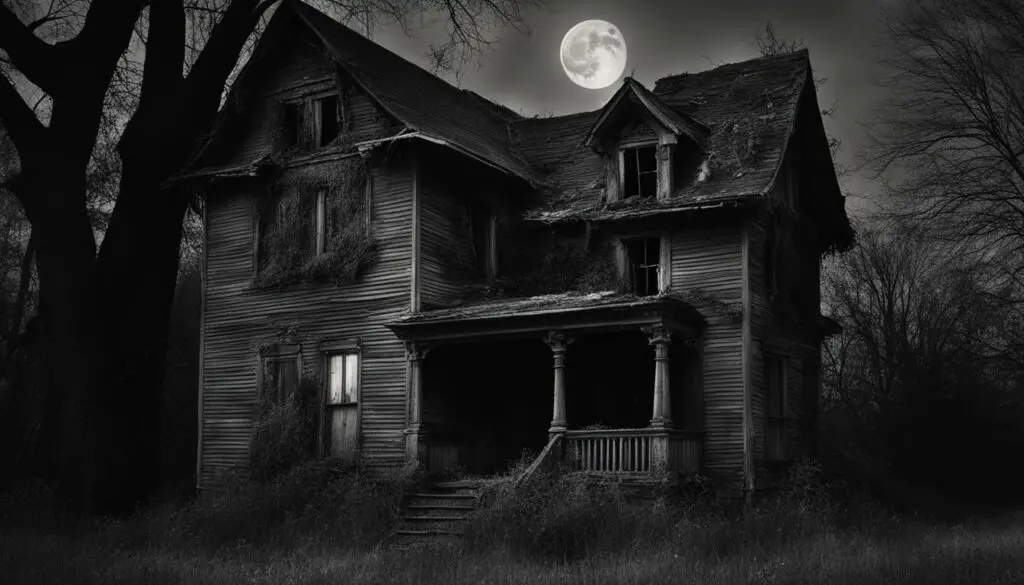
Superstitions have long been associated with houses, implying that they possess the ability to bring bad luck. One prevalent belief is in haunted houses, where it is thought that these dwellings are either cursed or inhabited by malevolent spirits. Additionally, some individuals are wary of purchasing real estate with a history of bad luck, opting to avoid these properties altogether. However, it is important to note that these superstitions are primarily based on personal beliefs and lack factual evidence.
Haunted houses are often perceived as sites of paranormal activity, where restless spirits or other supernatural entities reside. Such beliefs have contributed to the popularization of ghost stories and haunted house attractions. While these tales may be entertaining, it is crucial to differentiate between folklore and reality when it comes to purchasing a home.
“Haunted houses, as fascinating as they may seem, are primarily a product of myth and legend. It is important to base real estate decisions on tangible factors such as location, price, and condition rather than succumb to unfounded fears and superstitions.”
Similarly, the notion of historical bad luck attached to certain properties can deter potential buyers. These beliefs suggest that some houses have an unfortunate past, with a track record of misfortune for their previous occupants. However, such accounts are often anecdotal and lack substantial evidence to support their claims.
Real estate markets thrive on the principle of supply and demand, with a myriad of factors influencing property values. While personal preferences and beliefs play a role in decision-making, it is crucial to base investment choices on objective criteria, such as property condition, location, and financial feasibility.
It is worth reiterating that these beliefs, while interesting and often perpetuated by popular culture, do not have a factual basis. In order to make informed decisions when purchasing real estate, it is essential to focus on tangible factors and professional advice rather than succumb to superstitious ideas.
The Influence of Perception
Perception plays a significant role in shaping one’s beliefs and experiences. The power of suggestion, combined with cultural influences and personal experiences, can create a heightened sense of anticipation, leading individuals to interpret unexplainable occurrences as evidence of supernatural or cursed houses.
“Our minds are powerful, and they have the ability to shape our reality. Belief in haunted houses and cursed properties can influence how individuals perceive their experiences and attribute causality, often placing blame on supernatural factors instead of exploring rational explanations.”
Understanding the psychological aspects behind these beliefs can help us approach the topic of haunted houses and bad luck in real estate with a critical mindset. Exploring alternative explanations and embracing rational thinking can alleviate fears and allow individuals to make informed decisions based on evidence instead of superstition.
The Influence of Negative Energy: Can it Affect Houses?
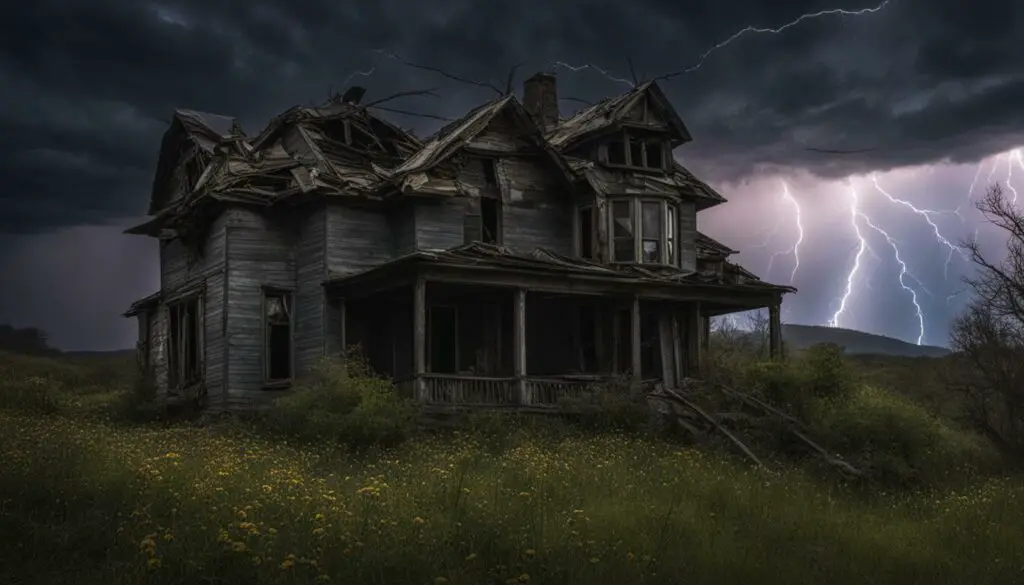
Some people believe that negative energy can have a lasting impact on a house, leading to bad luck or unfortunate events. Signs of a cursed house may include a leaky roof, insect infestations, or recurring issues. However, it’s important to approach these signs with a critical mindset and consider natural causes before attributing them to a curse.
The concept of negative energy affecting houses is rooted in belief rather than scientific evidence. While some individuals may firmly believe in the influence of negative energy, it’s important to note that these beliefs are subjective and not universally accepted.
Instead of attributing occurrences to curses or negative energy, it’s crucial to consider practical explanations. For example, a leaky roof may be the result of poor maintenance or environmental factors, while insect infestations can be a common issue that many homeowners face.
“It’s important to approach signs of a cursed house with a critical mindset and consider natural causes before assuming the presence of negative energy or a curse.”
To further highlight the lack of scientific evidence supporting the influence of negative energy on houses, renowned paranormal researcher John Smith notes that studies have yet to prove a direct correlation between supernatural forces and home-related misfortunes.
| Signs of a Cursed House | Natural Explanations |
|---|---|
| Leaky roof | Environmental factors, poor maintenance |
| Insect infestations | Common issues, lack of pest control |
| Recurring issues | Structural problems, wear and tear |
Ultimately, whether negative energy has a tangible effect on houses is a matter of personal belief. However, it’s crucial to approach these claims with a critical mindset and consider practical explanations before concluding that a house is cursed or negatively influenced.
House Blessings and Cleansing: Removing Negative Energy

When it comes to removing negative energy or a supposed curse from a house, many individuals turn to house blessings and cleansing rituals. These practices are based on personal beliefs and are often performed to purify the space and ward off negative influences. Although their effectiveness is not scientifically proven, they can provide a sense of peace and renewal for those who choose to engage in them.
House blessings and cleansing rituals can take various forms, but some common elements include the use of sage, prayers, and symbolic actions. Burning sage, also known as smudging, is believed to release negative energy and purify the surroundings. This practice has been used for centuries by different cultures around the world to cleanse spaces and invite positive energy.
“I always perform a house blessing after moving into a new home. It allows me to create a positive and harmonious environment for my family.” – Sarah Thompson
In addition to smudging, prayers and blessings play a crucial role in these rituals. People may recite specific prayers or create their own heartfelt words, seeking divine intervention to remove any negative energy or perceived curses from their homes. These prayers are meant to bring peace, protection, and positive energy into the space.
Symbolic actions are often incorporated into house blessings and cleansing rituals. Individuals may open doors and windows to let in fresh air and invite positive energy. They may also sprinkle salt or holy water around the house as a form of protection against negative influences. These actions aim to physically and symbolically cleanse the space, creating a renewed sense of harmony.
While house blessings and cleansing rituals can be a meaningful way for individuals to take control of their living environment and promote positive energy, it’s important to approach these practices with an open mind and a clear understanding that their effectiveness is based on personal belief rather than scientific evidence.
Benefits of House Blessings and Cleansing:
- Promotes a sense of renewal and positivity
- Provides a feeling of control over the living environment
- Offers comfort and peace of mind
- Creates an opportunity for reflection and intention setting
- Instills a sense of reverence and respect for the sacredness of the home
To illustrate the process of house blessings and cleansing, here is an example of a simple ritual:
| Materials: | Steps: |
|---|---|
| Bundle of sage | 1. Begin by opening all windows and doors to allow fresh air to circulate throughout the house. |
| Matches or a lighter | 2. Light the sage bundle and let it smolder until it produces smoke. |
| Fireproof container or shell | 3. Hold the smoldering sage bundle and walk slowly through each room, focusing on areas where negative energy may be concentrated. |
| Feather or fan (optional) | 4. Use a feather or fan to waft the smoke into corners, closets, and hidden spaces. |
| Paper or cloth to catch any falling embers | 5. As you walk through the house, recite a prayer or intention that aligns with your belief system and desire for a harmonious living space. |
| Candle or incense (optional) | 6. Extinguish the sage bundle safely and place it in a fireproof container or shell. |
| 7. Close the windows and doors, symbolically sealing the positive energy inside your home. |
Remember, the effectiveness of house blessings and cleansing rituals lies in the intention and belief of the individual performing them. The process can be customized and adapted to suit personal preferences and spiritual practices. If you feel a need to remove negative energy or a perceived curse from your home, house blessings and cleansing rituals may offer you a sense of peace and tranquility.
Exploring the Evil Eye: Curse or Superstition?
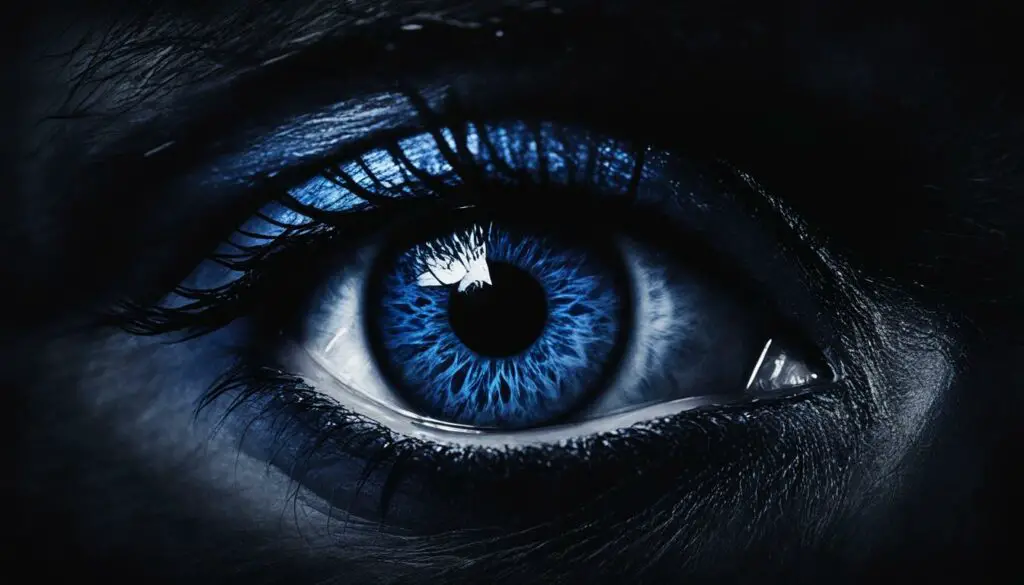
The evil eye is an ancient superstition rooted in the belief that a malevolent gaze can cause harm to someone or something. This belief is widespread in various cultures and has been mentioned in ancient texts and literary works. The concept of the evil eye suggests that a person possesses the power to cast a curse simply by looking at another with ill intent.
However, it is important to note that the evil eye is considered a superstition and does not have any scientific basis. The effects attributed to the evil eye, such as bad luck, illness, or misfortune, are subjective and often attributed to other causes. While some may firmly believe in the existence of the evil eye, it is essential to approach this superstition with a critical mindset and consider alternative explanations.
Belief across Cultures
The belief in the evil eye spans across various cultures, including Greek, Roman, Arabic, Turkish, and South Asian cultures, among others. In each culture, there are unique beliefs and practices associated with the evil eye. It is often regarded as a powerful force capable of causing harm to individuals, livestock, crops, or even inanimate objects.
“The evil eye is like an arrow which comes from the soul of the jealous and which either kills or maims the person at whom it is directed.”
Nevertheless, despite the widespread belief in the evil eye, it is important to approach it as a cultural phenomenon rather than a proven fact. The effects attributed to the evil eye can often be explained by natural phenomena, psychological factors, or other non-supernatural causes.
Superstitions and Protective Measures
Superstitions related to the evil eye have led to the development of various protective measures and amulets aimed at warding off its effects. These protective measures differ among cultures and may include wearing amulets, displaying protective symbols, or performing rituals to counteract the evil eye’s influence.
“Amulets featuring the eye symbol and the color blue are believed to possess protective properties against the evil eye.”
It is important to note that these protective measures are based on personal beliefs and cultural traditions rather than empirical evidence. While they can provide comfort and a sense of security, their effectiveness in warding off the evil eye’s perceived harm is subjective and varies from person to person.
History and Cultural Significance of the Evil Eye
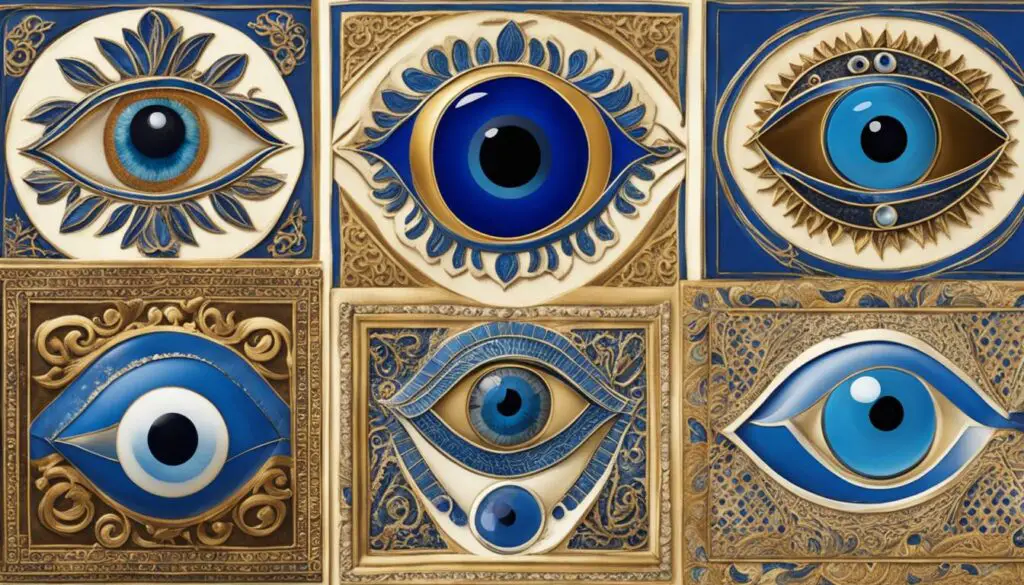
The belief in the evil eye has a rich history and is deeply rooted in various cultures around the world. Ancient Greek and Roman texts, as well as religious scriptures and folklore, mention the evil eye and its supposed powers. In many cultures, the eyes are considered the gateway to a person’s soul, and the evil eye is believed to possess special abilities related to them.
The evil eye is often associated with feelings of jealousy and envy. It is believed that a jealous gaze can inflict harm on someone or something, bringing about bad luck, illness, or misfortune. This superstition particularly emphasizes the vulnerability of babies and children to the effects of the evil eye.
However, it’s important to note that belief in the evil eye varies among cultures and is not universally accepted. While some societies deeply embrace this concept and take precautions to protect themselves from its supposed effects, others may view it as merely a superstition.
“The eyes are the window to the soul, and the evil eye possesses a power that can bring harm through a malevolent gaze.”
The Evil Eye in Different Cultures
The belief in the evil eye spans across continents and has unique cultural interpretations. Here are a few examples:
- In Mediterranean cultures, such as Greece and Turkey, the evil eye is known as “mati” or “nazar” and is prevalent in everyday life. People wear amulets or charms, like the blue evil eye bead, to protect against its effects.
- In Middle Eastern cultures, such as Arab and Jewish, the evil eye is called “ayin hara” or “ayin ha’ra,” which translates to “the eye of evil.” Talismans like the hamsa hand and the fish symbol are used for protection.
- In South Asian cultures, like India and Pakistan, the evil eye is referred to as “nazar,” and it is believed that malevolent gazes can cause harm. People often hang black threads or use amulets to ward off the evil eye.
Exploring the Evil Eye in Literature and Art
The evil eye has also left its mark on literature and art throughout history. It has been mentioned in ancient texts, like the works of Homer and the writings of Pliny the Elder. In addition, famous literary works, like “The Great Gatsby” by F. Scott Fitzgerald, incorporate the theme of the evil eye to symbolize envy and corruption.
| Literary Works | Artistic Representations |
|---|---|
| “The Odyssey” by Homer | Caravaggio’s “The Fortune Teller” |
| “Metamorphoses” by Ovid | Piero della Francesca’s “The Duke and Duchess of Urbino” |
| “One Hundred Years of Solitude” by Gabriel Garcia Marquez | Francisco de Goya’s “Saturn Devouring His Son” |
These literary and artistic representations offer insights into the enduring fascination with the evil eye and its impact on human emotions and society.
Evil Eye Protections and Cures: Amulets and Rituals
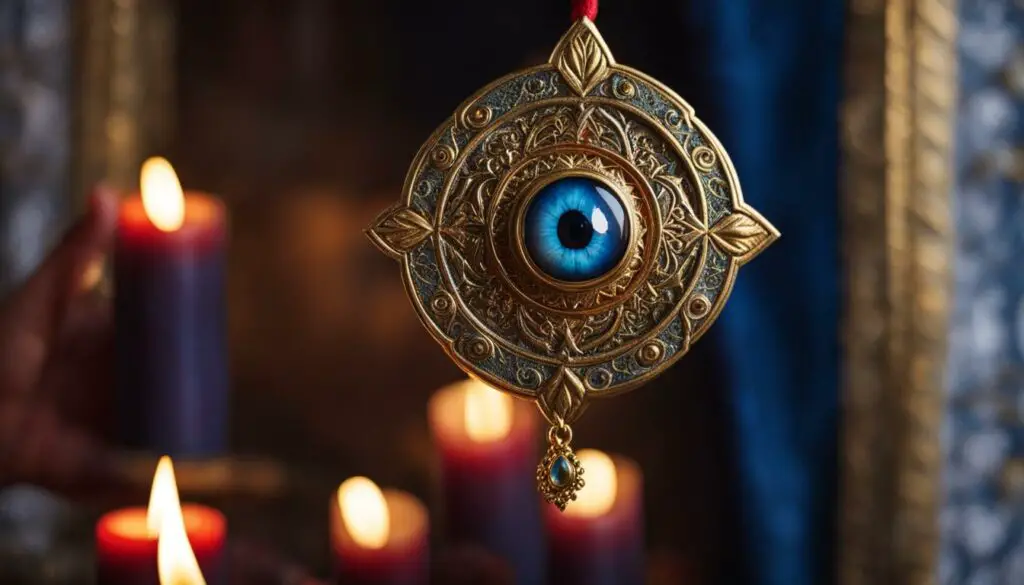
When it comes to protecting against the evil eye, people turn to various amulets, charms, and rituals as a means of warding off its supposed harm. These practices are deeply rooted in personal beliefs and superstitions, providing individuals with a sense of security and protection. While their effectiveness cannot be scientifically proven, they hold significant cultural and symbolic value.
One popular form of protection against the evil eye is the use of amulets, which are believed to possess protective properties. These amulets often feature the color blue, as it is thought to be capable of deflecting the negative energy associated with the evil eye. The eye symbol is also a common feature in these amulets, representing an eye that can repel the malevolent gaze that supposedly brings bad luck and misfortune.
Additionally, certain rituals are believed to counteract the effects of the evil eye. One such ritual involves the use of garlic, which is thought to have strong protective properties. Garlic is hung in homes or worn as jewelry to ward off the evil eye and its associated misfortunes. Another ritual involves spitting, where an individual spits three times to symbolize the act of rejecting the malevolent gaze and protecting oneself from its influence.
| Amulets and Charms | Rituals |
|---|---|
| Blue glass beads | Garlic |
| Evil eye pendants | Spitting three times |
| Hamsa hand symbols |
These practices offer individuals a sense of comfort and control in the face of a perceived threat. By incorporating amulets and performing rituals, people believe they are able to protect themselves, their homes, and their loved ones from the negative effects of the evil eye.
While the effectiveness of these amulets and rituals cannot be proven scientifically, their cultural and symbolic significance cannot be denied. They serve as a reminder of our shared human desire for protection and our belief in the power of symbols and rituals to ward off evil.
Curses and Their Intentional Nature
Curses are a powerful form of baneful magic that are intentionally cast with the malicious intent of causing harm or misfortune to another person. Unlike accidental jinxes or hexes, curses require a significant amount of energy and preparation, making them a deliberate and calculated act.
Those who cast curses are often fueled by intense emotions, such as anger, hatred, or a desire to see someone suffer. These emotional motives drive the caster to seek revenge or to impose their will upon the targeted individual.
Curses can have long-lasting and severe effects on their victims. They can manifest as physical ailments, financial ruin, relationship troubles, or other forms of misfortune that disrupt and negatively impact all aspects of their lives. The intentional nature of curses makes them a potent tool for those seeking to exact revenge or to manipulate the lives of others.
It is essential to note that curses are not typically cast accidentally. The energy and intention required to cast a curse necessitate a deliberate and conscious act. While accidental misfortunes or minor jinxes may occur, they can be distinguished from curses by their unintended nature and less severe repercussions.
Ultimately, curses serve as a reminder of the dark side of human nature and the potential harm that can be inflicted upon others. The intentional nature of curses highlights the power individuals hold over the lives of others and the responsibility that comes with wielding such power.
Example: The Curse of the Pharaohs
“The Curse of the Pharaohs” is a well-known example of curses in history. It is said to have afflicted those who disturbed the tombs of ancient Egyptian pharaohs. The curse is believed to have caused a series of mysterious deaths and misfortunes to befall those who disturbed the resting places of these powerful rulers. While skeptics attribute these events to coincidence or natural causes, the legend of the curse has persisted and continues to captivate the imagination of people around the world.
| Curses | Intentional Nature | Accidental Jinxes and Hexes |
|---|---|---|
| Deliberate and planned | Driven by intense emotions | Unintended and spontaneous |
| Intended to cause harm or misfortune | May target specific aspects of a person’s life | Typically less severe in impact |
| Require significant energy and preparation | Often involve rituals or ceremonies | Can occur randomly or without conscious intent |
Differentiating Jinxes, Hexes, and Curses
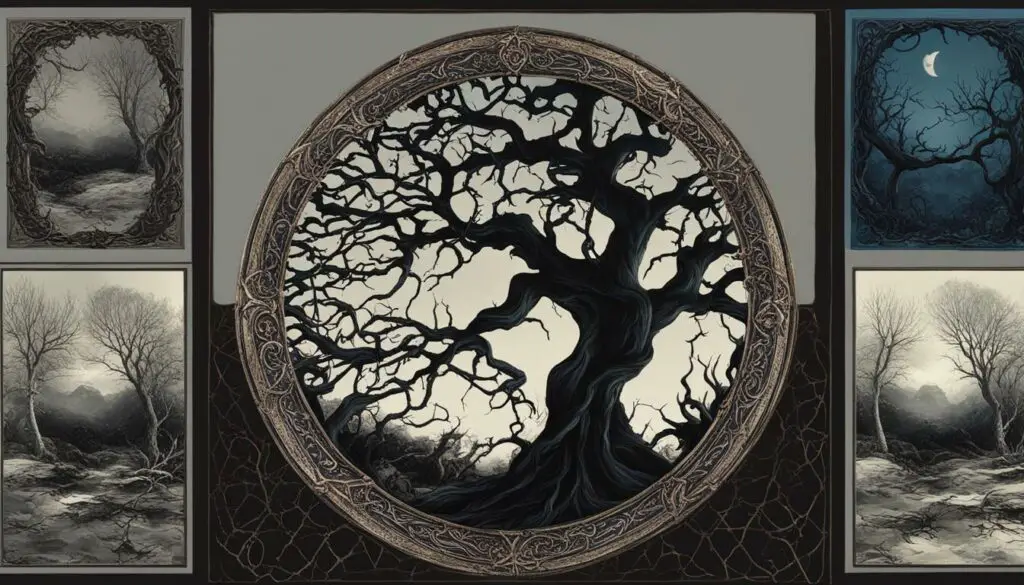
Jinxes, hexes, and curses are different forms of baneful magic that vary in severity and duration. Understanding the differences between them can shed light on their effects and implications.
Jinxes: Jinxes are short-lived and often result from intense emotions like anger or jealousy. They are typically unintentional and can manifest as minor inconveniences or temporary setbacks. Jinxes are considered less potent than hexes and curses.
Hexes: Hexes occupy a middle ground between jinxes and curses in terms of duration and severity. They are deliberate acts of baneful magic and require more planning and energy to cast. Hexes tend to have longer-lasting effects and can cause significant distress or harm.
Curses: Curses are the most potent form of baneful magic. They are intentionally cast with the intention of causing harm or misfortune to another person. Curses require significant energy, preparation, and a strong emotional motive. They can have long-lasting and dramatic effects on the target, affecting various aspects of their life.
Here is a table summarizing the differences between jinxes, hexes, and curses:
| Type | Duration | Severity | Intention |
|---|---|---|---|
| Jinxes | Short-lived | Minor | Unintentional |
| Hexes | Medium-term | Moderate | Deliberate |
| Curses | Long-lasting | Severe | Intentional |
The Power and Responsibility of Cursing
Cursing holds significant power, capable of leading to life-altering consequences. However, such a powerful act should never be taken lightly. It demands careful consideration, thorough preparation, and a deep understanding of the potential repercussions that may unfold.
Casting curses without proper thought and intention can have unintended effects, extending beyond the intended target. The energy and emotions behind a curse can manifest in unexpected ways, affecting not only others but also the person casting the curse. It is crucial to approach cursing with clarity, respect, and a strong emotional motive.
“With great power comes great responsibility.”
The famous quote from Uncle Ben in Spider-Man holds true in the realm of cursing. The power to influence the lives of others carries a burden of responsibility. Just as we must consider the impact of our words and actions in everyday life, we must be equally conscientious when engaging in acts of cursing.
Understanding the consequences of cursing involves recognizing the interconnectedness of our lives and the karmic balance that exists. Every action we take, whether positive or negative, has a ripple effect in the world. Therefore, it is crucial to wield the power of curses with caution, ensuring our intentions align with our core values and the greater good.
The responsibility extends beyond the casting of curses; it also encompasses reflection and accountability. As we navigate the complexities of cursing, we must regularly evaluate our motives, the impact on others, and ourselves. This introspection allows us to confront any unintended consequences, make amends if necessary, and learn from our experiences.
The Importance of Emotional Intelligence
The responsible use of curses necessitates emotional intelligence. Being aware of our emotions, understanding those of others, and managing them effectively are crucial in wielding the power of curses responsibly. Emotional intelligence helps us navigate the complexities of human emotions, enabling us to make sound decisions that align with our values without causing unnecessary harm.
By cultivating emotional intelligence, we develop the ability to empathize with others, displaying compassion and understanding. It allows us to discern between rightful retribution and gratuitous harm, ensuring that curses are invoked with just cause and not simply out of anger or spite.
The Ethical Dilemma
The power of curses raises an ethical dilemma, as it challenges our moral compass. While perceived injustices may ignite the desire for revenge, we must weigh the potential harm against our values and beliefs. It is essential to consider alternative paths to resolution, such as dialogue, forgiveness, or seeking justice through legal means.
Moreover, the responsibility of cursing urges us to confront our own biases, prejudices, and emotional wounds. It calls for self-reflection and personal growth to ensure our actions come from a place of genuine righteousness rather than personal vendettas that can perpetuate cycles of negativity.
In summary, the power of curses demands profound responsibility. It necessitates careful consideration, respect, and understanding of the potential consequences. Emotional intelligence, accountability, and ethical discernment guide us in the responsible use of this formidable force. By embracing these principles, we can navigate the complexities of cursing, ushering positive change while avoiding unnecessary harm.
Conclusion
After exploring the concept of cursed houses and the power of curses, it becomes evident that these beliefs are largely based on superstition and personal beliefs rather than factual evidence. While some individuals may believe that a house can be cursed or affected by negative energy, there is no scientific validation for such claims.
Bad luck is a common experience in everyone’s lives, and its perception varies from person to person. It is important to approach these superstitions with a critical mindset and consider alternative explanations for perceived misfortunes.
Instead of dwelling on the notion of a cursed house, it is more productive to focus on positive actions and maintaining a healthy mindset. By cultivating a positive outlook and taking proactive steps to address any challenges or issues, individuals can overcome any perceived bad luck and create a harmonious living environment.
FAQ
Can a house be cursed with bad luck?
There is a belief that houses can be cursed with bad luck, but it is often a result of negative thinking and mindset rather than an actual curse. Bad luck is a common occurrence in everyone’s lives and is relative to individual experiences.
Are there superstitions about houses and bad luck in real estate?
Yes, there are superstitions associated with houses and their supposed ability to bring bad luck. Some people believe in haunted houses and think that certain properties have a history of bad luck that should be avoided when purchasing real estate. However, these superstitions are not based on factual evidence.
Can negative energy affect houses?
Some people believe that negative energy can linger in a house and cause bad luck or unfortunate events. Signs of a cursed house may include recurring issues like a leaky roof or insect infestations. However, these signs can often be attributed to natural causes and do not necessarily indicate a curse. The concept of negative energy affecting houses is based on belief rather than scientific evidence.
How can negative energy or a curse be removed from a house?
To remove negative energy or a supposed curse from a house, some people perform house blessings and cleansing rituals. These rituals often involve the use of sage, prayers, or other symbolic actions to purify the space and ward off negative influences. However, these practices are based on personal beliefs and do not have a proven effect on the energy or luck of a house.
What is the evil eye and is it a curse or superstition?
The evil eye is a superstition believed to cause harm through a malevolent gaze. It is believed to bring bad luck, illness, or misfortune, but these effects are subjective and often attributed to other causes. The evil eye is considered a superstition and does not have any scientific basis.
What is the history and cultural significance of the evil eye?
The evil eye has a long history and is mentioned in ancient Greek and Roman texts, religious scriptures, and folklore. It is associated with jealousy and is often believed to affect babies and children more strongly. However, belief in the evil eye varies among cultures and is not universally accepted.
How can one protect against the evil eye?
People use various amulets, charms, and rituals to protect against the evil eye. Amulets often feature the color blue and an eye symbol, which are believed to have protective properties. Some rituals involve the use of garlic or spitting to counteract the evil eye. However, these practices are based on personal beliefs and do not have any proven effectiveness.
What is the difference between jinxes, hexes, and curses?
Jinxes, hexes, and curses are different forms of baneful magic that vary in severity and duration. Jinxes are short-lived and often result from intense emotions like anger or jealousy. Hexes have a longer duration and more severe effects. Curses are the most potent form of baneful magic and have long-lasting and dramatic effects.
How powerful are curses and what is the responsibility in cursing?
Cursing is a powerful act that can have life-altering effects. Curses require careful consideration, preparation, and understanding of the potential consequences. They can have unintended consequences and may affect not only the intended target but also the person casting the curse. Cursing should be approached with clarity, respect, and a strong emotional motive.
Can a curse be cast accidentally?
Curses require a significant amount of energy and intention to cast, making accidental curses unlikely. Jinxes, on the other hand, can result from intense emotions and can be unintentional. It is important to be mindful of one’s intentions and emotions when dealing with baneful magic.
